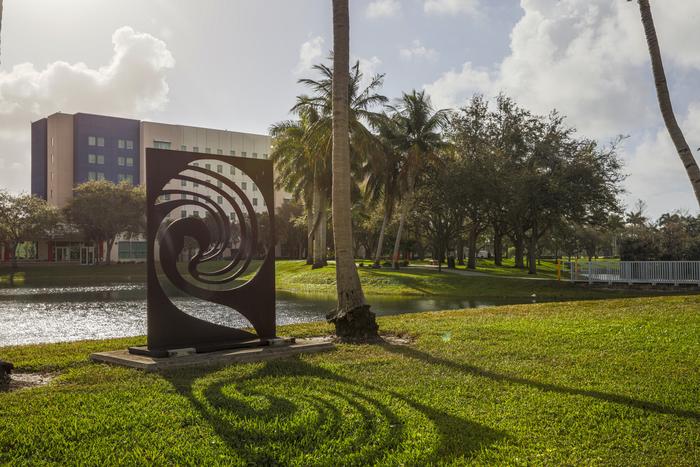Considerable attention has focused on burnout and mental health of physicians and nurses on the frontline during the COVID-19 pandemic. First responders – law enforcement personnel, firefighters and emergency medical service (EMS) providers, also experienced increased levels of stress, anxiety and depression due to job-related pressures associated with the pandemic.

Credit: Alex Dolce, Florida Atlantic University
Considerable attention has focused on burnout and mental health of physicians and nurses on the frontline during the COVID-19 pandemic. First responders – law enforcement personnel, firefighters and emergency medical service (EMS) providers, also experienced increased levels of stress, anxiety and depression due to job-related pressures associated with the pandemic.
Given their exposure to work-related stress during this time, first responders may have been at considerable risk of developing problematic substance use. However, little is known about the factors associated with first responder drug and alcohol use during the pandemic.
A study by Florida Atlantic University and collaborators used a nationwide online survey to assess the experiences of 2,801 first responders serving in police departments, fire stations and EMS agencies during the early stages of COVID-19 (late 2020 to early 2021). Researchers examined the mediating impact of burnout on the associations between work pressure, workplace support strategies, COVID-related support strategies and problematic substance use.
Findings of the study, published in the International Journal of Drug Policy, showed:
- Almost 61 percent of respondents reported no concerns with substance use.
- Nearly 40 percent of respondents reported using substances to relieve emotional discomfort.
- About 22 percent of respondents reported using more substances than they meant to use.
- Twenty-one percent of respondents reported that they could not cut down on substance use.
- Only 7.2 percent of respondents reported neglecting responsibilities because of substance use.
- For problematic substance use, firefighters (12.7 percent) had a slightly higher score than EMTs (11.4 percent) and police officers (8.1 percent).
Results also revealed that although work pressures increased burnout and problematic substance use among first responders, general workplace support strategies such as decompression spaces reduced problematic substance use. Conversely, some COVID-related strategies such as compensation during quarantine increased problematic substance use. These results suggest a complex relationship between COVID-related support strategies and problematic substance use that may be influenced by stress associated with quarantine measures and greater availability of substances while off-duty.
“First responders represent a unique population as they have increased exposure to trauma and stress, which can be exacerbated by public health epidemics,” said Kaila Witkowski, Ph.D., senior author and an assistant professor, FAU School of Public Administration within the Dorothy F. Schmidt College of Arts and Letters. “Spaces to decompress at work that combine quiet and relaxing spaces with easily accessible mental health resources may be one way to overcome various barriers in this population such as the stigma associated with seeking help.”
Study findings also suggest that strategies aimed at reducing work-related burnout could focus on improving personal resiliency. Researchers highlight the resiliency training program that was provided for first responders involved with the 2012 Aurora, Colorado movie theater mass shooting as an example, which used problem-based learning techniques to teach resiliency skills, resulting in benefits to coping with stress.
“Although intended to reduce stress associated with the job, organizations should be mindful that not all support strategies will have their intended impact, and some may even unintentionally increase stress, burnout, and problematic substance use,” said Witkowski. “While we are not contending that compensation during quarantine is a negative workplace strategy, our study highlights the nuances of the COVID-19 quarantine measure, suggesting that additional stressors may have been placed on first responders throughout this process or that other beneficial workplace strategies were not easily accessible or used during this time.”
Study co-authors are Ryan J. Lofaro, Ph.D., an assistant professor of public administration, Georgia Southern University and recent FAU graduate; Andrea Headley, Ph.D., an assistant professor, McCourt School of Public Policy at Georgetown University; Santina Contreras, Ph.D., an assistant professor, Sol Price School of Public Policy, University of Southern California; Christa L. Remington, Ph.D., an assistant professor, School of Public Affairs, University of South Florida; and N. Emel Ganapati, Ph.D., an associate professor and director, Laboratory for Social Science Research, Florida International University.
This research was funded by the Drug Enforcement and Policy Center at The Ohio State University.
– FAU –
About Florida Atlantic University:
Florida Atlantic University, established in 1961, officially opened its doors in 1964 as the fifth public university in Florida. Today, the University serves more than 30,000 undergraduate and graduate students across six campuses located along the southeast Florida coast. In recent years, the University has doubled its research expenditures and outpaced its peers in student achievement rates. Through the coexistence of access and excellence, FAU embodies an innovative model where traditional achievement gaps vanish. FAU is designated a Hispanic-serving institution, ranked as a top public university by U.S. News & World Report and a High Research Activity institution by the Carnegie Foundation for the Advancement of Teaching. For more information, visit www.fau.edu.
Journal
International Journal of Drug Policy
DOI
10.1016/j.drugpo.2023.104261
Method of Research
Survey
Subject of Research
People
Article Title
Understanding problematic substance use among first responders during the COVID-19 pandemic: A survey of law enforcement, fire, and EMS workers in the United States
Article Publication Date
25-Nov-2023




